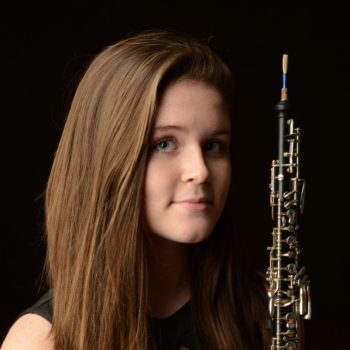Livingstone Undergraduate Research Award in Creative Works and Media Production
Livingstone Undergraduate Research Award in Creative Works and Media Production
Marissa Harley

Bach Transcribed for Oboe: History and Interpretation
View Marissa’s project online
In my project, “Bach Transcribed for Oboe: History and Interpretation,” I studied and researched J.S. Bach’s Concerto in C Minor for violin, oboe, and strings (BWV 1060R). I researched the history of the reconstruction of this piece for oboe and violin and analyzed recordings and performance traditions of the solo oboe with recordings ranging from 1950–2020. Some recordings featured the use of the Baroque oboe, while others used the modern instrument. In my research I looked specifically at the opening Allegro movement and chronologically analyzed the recordings mentioned in my paper, making specific claims of performance techniques and interpretations for specific musicians/recordings in addition to general claims on performance styles and techniques of the time period the recording was made.
What is your major and expected year of graduation?
I am a music performance major with a concentration in oboe, and I am expected to graduate in spring of 2023.
What inspired you to pursue your project?
I was very excited to work on my research throughout the process because it was a topic that I felt comfortable and capable of exploring, being a musician. I was definitely inspired by the discussions on Bach’s solo works for unaccompanied violin and cello that took place in Dr. Zohn’s class, and was excited to take those ideas and apply them to my primary instrument, the oboe.
What does winning this award mean to you?
Winning this award means so much to me. I feel extremely proud of my work and the extent of time that I spent listening to, working on, and researching the Baroque oboe, Bach’s work with the oboe, and BWV 1060R specifically. I am honored to receive this award and for the recognition of my work. I am thrilled that I have been given the opportunity to share it.
How did the Libraries support your research?
Temple Libraries played a large role in my research process in that I also was able to find many helpful secondary literature sources to support my research claims through online databases provided by Temple Libraries’ website. These databases provided me with the platforms in which I was able to easily and efficiently find high-quality sources on my research topic of Bach and his exquisite contributions to solo oboe repertoire, as well as general and specific history on the Baroque oboe. Finding journal articles providing insight on my research made the process both more enjoyable and straightforward. The abundant sources of material that I was lucky enough to have access to via Temple Libraries both in person located at Charles Library as well as the online Temple Libraries’ website were of enormous benefit to my research process overall.
Marissa Harley’s paper on Johann Sebastian Bach’s Concerto in C minor for oboe, violin, and strings, BWV 1060R, originated in my writing-intensive course “Music Minus One: Bach’s Music for Unaccompanied Melody Instrument.” In a classroom that combined undergraduate and graduate students, Marissa stood out as the hardest worker. Thus I was not surprised when she chose an unusually ambitious topic for her term paper and produced an excellent piece of research. During the process of revising her work, Marissa diligently incorporated new sources, reorganized her data, and refined her arguments and writing. I could scarcely have asked for more, in terms of both process and outcome.
—Steven D. Zohn, Laura H. Carnell Professor, Boyer College of Music and Dance
This category covers research which culminates in a creative or multimedia work in areas such as Visual Arts, Music, Dance, Theater, or Media Production.
This award is generously sponsored by John H. Livingstone, SBM ’49.
